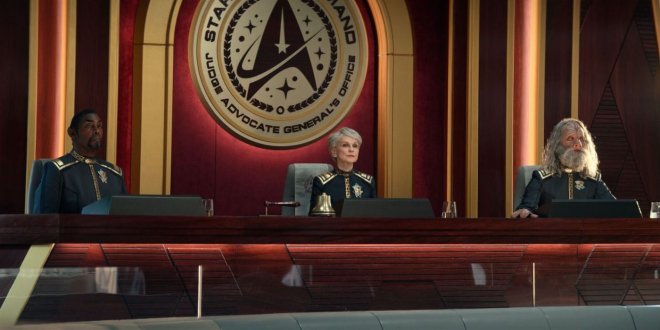
Warning: SPOILERS for Star Trek: Strange New Worlds Season 2, Episode 2 – "Ad Astra Per Aspera"
The second episode of Star Trek: Strange New Worlds season 2 not only puts Number One (Rebecca Romijn), the USS Enterprise First Officer Una Chin-Riley, on trial but also puts Starfleet itself on trial. "Ad Astra Per Aspera" follows through on the cliffhanger of Strange New Worlds season 1 that saw Number One arrested for lying on her Starfleet application about being a genetically-modified Illyrian. The episode calls Starfleet's augment ban into question and forces the trial judges to rethink their previous assumptions. In the end, Starfleet upholds its ideals and makes the right call regarding Una, even if they cannot fully investigate the augment ban itself.
Following in the tradition of the many Star Trek courtroom episodes that came before it, Star Trek: Strange New Worlds season 2, episode 2, "Ad Astra Per Aspera" spends most of its runtime on the trial itself. Una emotionally recounts her experiences as a young Illyrian hiding her identity from the United Federation of Planets when she grew up in a Federation colony in the Vaultera Nebula. Una's friend and lawyer, Neera Ketoul (Yetide Badaki), implores Starfleet to favor their more empathic laws over their harsher ones. Though the trial raises many questions about Starfleet's laws and their augment ban, Strange New Worlds "As Astra Per Aspera" ends with Una right where she's meant to be – as First Officer on the USS Enterprise.
Strange New Worlds Put Starfleet On Trial Along With Number One  As part of her defense of Una, Neera brings up Number One's former Captain, Admiral Robert April (Adrian Holmes), and her current Captain, Christopher Pike (Anson Mount). She goes after April with particular gusto, calling into question several decisions he made in the past that went against Starfleet's most important law, the Prime Directive. Pike's character is called into question when the trial reveals that he found out about Una's Illyrian heritage four months before her arrest. In the end, all of Neera's apparent accusations serve to make an important point: Sometimes Starfleet officers must use their own judgment when making decisions rather than following the exact letter of the law.
As part of her defense of Una, Neera brings up Number One's former Captain, Admiral Robert April (Adrian Holmes), and her current Captain, Christopher Pike (Anson Mount). She goes after April with particular gusto, calling into question several decisions he made in the past that went against Starfleet's most important law, the Prime Directive. Pike's character is called into question when the trial reveals that he found out about Una's Illyrian heritage four months before her arrest. In the end, all of Neera's apparent accusations serve to make an important point: Sometimes Starfleet officers must use their own judgment when making decisions rather than following the exact letter of the law.






